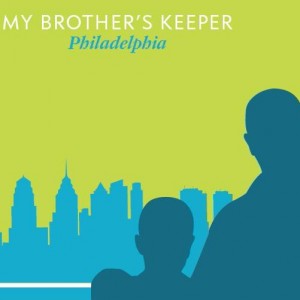A self-described “proud son of West Philadelphia,” Jack Drummond is now Director of the Office of Black Male Engagement. During Black History Month, Jack shared his vision for unifying efforts to empower Black men and boys throughout the city.
Q: Tell us about yourself. Where’d you grow up and go to school?
A: I’m from an area we lovingly call “down the bottom,” which is the Mantua section of the city. I attended public schools from K-12 in West Philly and Southwest Philadelphia as well as Overbrook. Then I went to Lincoln University, one of the nation’s historically black colleges and universities. Now, I’m at Temple in North Philadelphia, so I’ve gotten my share of Philadelphia by moving from place to place.
Q: How’d you find yourself heading up the Office of Black Male Engagement?
A: I started at the Center for Male Engagement at the Community College of Philadelphia in 2010 where I was one of the support coaches. It’s a program where we took men who were in higher education, and we helped them successfully graduate from the institution. We also supported them with life and leadership skills.
Q: Why is the Office of Black Male Engagement so important?
A: A large contingency of Black men and boys fall in the lower tiers or rungs of life outcomes. If you look at education, Black men and boys fall on the lower tiers. If you look at health and wellness, Black men and boys fall on the lower tiers. If you look at justice and how we engage with the justice system — you get the idea. Therefore, the need to support this demographic becomes important.
Q: How can your office engage Black men and boys in the city?
A: I think traditionally, we have looked at the way that we provide support from a deficits model. We look at a problem, an existing problem, and we either throw dollars or people power around that particular problem. I’d like this office in particular to look at things from a holistic perspective, not to simply identify problems but also look at assets — and to begin to tell those positive stories about men and boys who have exhibited signs of resiliency, exhibited strength that they have the ability and power to bounce back from precarious situations growing up in the city. I don’t think that we highlight those stories enough.
 Q: What is your vision of the Office of Black Male Engagement?
Q: What is your vision of the Office of Black Male Engagement?
A: First and foremost, I’d like to create a unifying body that will bring together some of the existing Black male initiatives that are in the city. Quite often, we don’t know what’s going on in the city from one section to another because we sort of operate in “silos.” We need to foster solidarity between one program and another so that we’re all on the same page.
Second, we’re looking at making sure that we continue to grow My Brother’s Keeper and continue to help facilitate highlighting those positive aspects and milestones that define MBK.
Third, I’d like to strengthen the conversation that we currently have with the Commission on African American Males, really using the commission to be the liaison between the community and the City.
Q: Tell us about that community piece.
A: As a city of neighborhoods, we’re sometimes not as community-based as we could be. There are many people who grow up next door to someone and don’t even know about the people they live next door to! So, creating a community mindset really has to do with the way we communicate with each other.
Q: Can we use technology or social media to communicate?
A: I actually think technology has sometimes helped us avoid communication, like one-on-one conversations! I’d like to integrate those personal communications and social media and technology, to bridge that digital divide. We’re definitely going to utilize social media as a tool for communication to establish a rapport with youth groups and share ideas and engage with them.
To stay up-to-date on Jack and the Office of Black Male Engagement, be sure to follow My Brother’s Keeper on Twitter!
